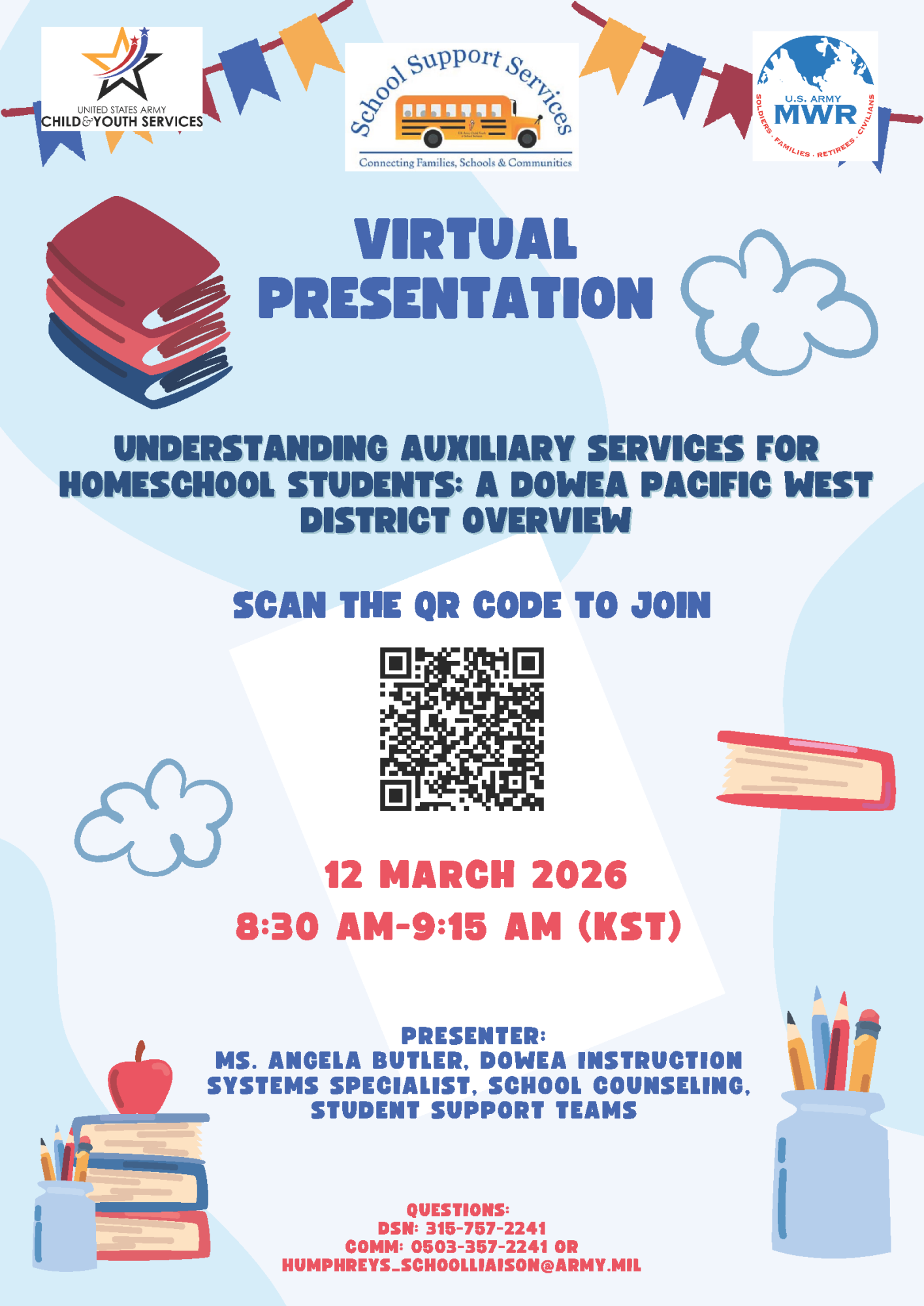- Helping schools understand the challenges military Families face
- Informing parents about local school policies
- Giving Families information about local schools, graduation requirements, after school programs, youth sponsorship and homeschooling
- Connecting units and schools through partnership initiatives
- Conducting workshops to help parents navigate educational transition and advocate for their children
- Providing an array of resources that benefit military youth and improve school experiences
- When Do I Need a SLO?
-
Getting ready to move:
- Information about your upcoming duty station and educational options in your new community
- Connection to a youth sponsor who can answer your child’s questions from a youth’s perspective
- Assistance with the steps to prepare for your children’s departure from their current schools
Once you arrive:
- Assistance with school registration and transition
- Help with questions about compliance and solutions regarding the Interstate Compact on Educational Opportunity for Military Children
- Two way communication between the school and parent
- Connection with homeschool co-ops or support groups
During your assignment:
- Answers to your questions about schools, homeschooling, special education, scholarships, transitions and more.
- Parent education opportunities about college and career readiness, preparing for transition and the Interstate Compact
To ease the transition, contact your SLO as soon as you get orders.
Getting ready to move:
- Information about your upcoming duty station and educational options in your new community
- Connection to a youth sponsor who can answer your child’s questions from a youth’s perspective
- Assistance with the steps to prepare for your children’s departure from their current schools
Once you arrive:
- Assistance with school registration and transition
- Help with questions about compliance and solutions regarding the Interstate Compact on Educational Opportunity for Military Children
- Two way communication between the school and parent
- Connection with homeschool co-ops or support groups
During your assignment:
- Answers to your questions about schools, homeschooling, special education, scholarships, transitions and more.
- Parent education opportunities about college and career readiness, preparing for transition and the Interstate Compact
To ease the transition, contact your SLO as soon as you get orders.
- Finding a School
-
Department of Defense Education Activity-Pacific (DoDEA-P) is available for families with school-age children assigned to USAG Humphreys. Schools include:
- Humphreys Central Elementary School Grades K-4th
- Humphreys West Elementary School Grades K-4th
- Humphreys Middle School Grades 5th-8th
- Humphreys High School Grades 9th-12th
Find out more about DoDEA-PAC West
A child must be five years old by September 1 to enroll in kindergarten. The change aligns DoDEA with national trends as well as the age requirement in many military-impacted states. A child must be four years old by September 1 to attend universal pre-kindergarten and six years old by September 1 to attend first grade.
How do I enroll for school?
For online registration, please visit the DoDEA website
For more information, please call DODEA's district school registrar at
DSN: (315) 755-1169 or (+82 (0)50-3355-1169)
pacwestdso_supportstaff@dodea.edu
School Choice Options
Public Korea School Choice: Children between the ages of six and fifteen are required to attend school in South Korea. There are six years of elementary school, three years of junior high school and three years of senior high school. Students typically attend their local elementary and junior high schools; they do not have a great deal of school choice until the end of compulsory education, which is at the end of junior high school.
Private Schools: Pyeongtaek International Christian School is a not-for-profit school offering a balanced education. Fully accredited by both the Western Association of Schools and Colleges (WASC) and the Association of Christian Schools International (ACSI), International Christian School provides a quality educational program that prepares students to continue their studies at leading universities throughout the world.
Reminders:
Enroll your children as soon as possible. It is not recommended that you delay enrolling your children when you transition to a new installation. Some families have delayed enrolling their children for up to a month and have risked their child repeating a grade.
After you enroll, return to the school and provide the school with updated contact information. Schools often contact USAG Humphreys’ School Support Services trying to find a parent in an emergency because the parent failed to provide updated contact home/work info.
All DoD schools have School Advisory Committees (SAC). The committee advises the principal on matters within the jurisdiction of the school and DoDEA. Contact your school's website under the "Get Involved" tab for more information.
- Legal Considerations for Homeschooling
-
Legal Considerations for Homeschooling
- Families stationed overseas are not subject to U.S. state compulsory attendance laws. Families are not required to register their children through DODEA when homeschooling for any form of tracking. However, auxiliary services are available for eligible families. If one wants to participate in auxiliary services, they must register their homeschool student(s) with DODEA.
- DoDEA recognizes homeschooling and allows limited class access for eligible students.
Under the U.S.–ROK SOFA (1966, Article VIII), U.S. military dependents are exempt from Korean immigration and registration laws, including those that would otherwise require enrollment in Korean public schools. Education of SOFA-status children is managed under U.S. laws and policies.
Per DoDEA AI 1375.01, DoDEA provides auxiliary services to eligible homeschoolers stationed overseas, allowing access to school libraries, academic resources, extracurriculars (sports, music, clubs), after-hours facilities, and enrollment in up to three classes (including electives and special education).
- Access to academic resources and school libraries
- After-hours use of DoDEA facilities
- Participation in extracurricular programs such as music, sports, clubs, and interscholastic activities
- Enrollment in individual classes (e.g., P.E., art, core academics) for grades 6–12
DoDEA Educational Opportunities for Homeschool Students
Eligible homeschool students may access the following:
- Course Enrollment: Up to 3 DoDEA classes
- Special Education Services: Support based on an IEP
Students participating in DoDEA courses or activities must:
- Complete registration
- Follow attendance and grading policies
- Adhere to DoDEA code of conduct
Students may also participate in after-school clubs, athletics, music, and interscholastic programs offered by their zoned school (based on duty location).
- Youth Sponsorship
-
Does your child have 101 questions about your next duty station? Let a youth sponsor answer them!
Youth sponsors connect with children before arrival at a new duty station, provide them with information about their new communities and answer questions from a youth perspective – while being guided by adults in the CYS youth program and the schools.
Once you arrive, a youth sponsor will meet your child and can arrange community and school tours.If you're preparing for a PCS move, contact your School Liaison Officer today to sign up for a youth sponsor.
-
Does your child have 101 questions about your next duty station? Let a youth sponsor answer them!
Youth sponsors connect with children before arrival at a new duty station, provide them with information about their new communities and answer questions from a youth perspective – while being guided by adults in the CYS youth program and the schools.
Once you arrive, a youth sponsor will meet your child and can arrange community and school tours.If you're preparing for a PCS move, contact your SLO today to sign up for a youth sponsor.
-
- Special Education Information
-
If you have a child with special needs, we can help you find the resources available in your school district. We can also connect you with your local installation’s Exceptional Family Member Program (EFMP) office. Additional information available at the Army Medical EFMP
- Additional References & Resources for Special Education
-
Highly mobile children are entitled to an expedited process, including: a) evaluations in 30 days instead of 60 days, b) removed delays due to school district schedules for Families moving during incomplete screenings, c) continued Extended School Year for students moving in the summer. The United State Department of Education, Office of Special Education and Rehabilitative Services outlines these requirements for State Directors of Special Education.
The Center for Parent Information and Resources offers parent education, acronyms, tools, webinars and a directory of local Parent and Information Training Centers to appropriately advocate for their children, proactively supporting personal accountability. Funded by OSEP.
Military OneSource has a range of resources in caring for a family member with special needs: education, health care, legal, financial, points of contact (EFMP, School Liaisons, etc.)
Military Community & Family Policy-Office of Special Needs provides directory of age-specific resources and States at a Glance for state education special education resources and parent resources.
DirectSTEP provides no-cost, Army sponsored online training for educators and parents on a host of special education topics such as understanding federal requirements, best practices for behavior management, IDEA eligibility, IEPs and more. Through the eCourses parents and educators learn how to apply education laws in order to obtain positive outcomes associated with critical education issues. Access the course listing and registration page through the links below.
- Home School
-
Home schooling has become mainstream and widely-used. We offer resources and information to help you provide quality home-based education.
Home School Legal Defense Association provides information on home school law, and general support and information about homeschooling. Learn more about DoDEA Home School Policy.
The Department of Defense Education Activity (DoDEA) has no jurisdiction over the education of overseas military dependent children. It is DoDEA policy to neither encourage nor discourage DoD sponsors from home schooling their minor dependents. DoDEA recognizes that homeschooling is a sponsor’s right and can be a legitimate alternative form of education for their dependents. According to DoD policy, the installation Commander’s responsibilities are logistical or administrative, there is no educational oversight regarding the public education provided by DoDDS.
There are frequently asked questions among home schoolers: Whose law do I follow – the state/country where we are stationed, or our state of residence? What are the military regulations related to homeschooling? Are there support groups at every installation? Is there a phone number that I can call to find out about homeschooling on any particular installation?
The Department of Defense Education Activity (DoDEA) has no jurisdiction over the education of overseas American military dependent children. It is DoDEA policy to neither encourage nor discourage DoD sponsors from home schooling their minor dependents. DoDEA recognizes that homeschooling is a sponsor’s right and can be a legitimate alternative form of education for their dependents. According to DoD policy, the installation Commander’s responsibilities are logistical or administrative, there is no educational oversight regarding the public education provided by DoDEA.
In order for homeschooling to succeed, parents need to have the time and energy to provide instruction on a daily basis and be involved in a local support group. Numerous avenues of support are usually available, so do some research and get connected with a local support group in your community. Some parents form groups with other home-schooled families or encourage their children to join community sports teams, clubs, or other groups. Many families are involved in homeschooling support groups. These groups of parents share responsibilities, including choosing and adapting curriculum, the actual teaching of the lessons, and some method of grading and evaluating whether the student has learned the necessary lessons.
What’s best for somebody else’s child may not be best for yours. Before making a decision, it’s important to gather as much information as you can to find out about the kind of education that would benefit your child the most, whether it’s homeschooling or it’s another kind of school.
Other Home School Websites:
- Transition Support
-
We understand that military transitions for children include much more than school plans and enrollment. We have a number of resources to help make your move as easy as possible for the kids, including:
Military Kids Connect provides online age-appropriate resources to help parents, teachers and children cope with the unique challenges of military life.
The Interstate Compact on Educational Opportunity for Military Children (MIC3) addresses key transition issues military Families experience, including enrollment, placement, attendance, eligibility and graduation. All 50 states have signed the compact and are in varying stages of implementation and/or compliance. The compact applies to children of Active Duty service members, National Guard and Reserve members on active duty orders and members or veterans who are medically discharged or retired within past year.
If you feel that you have an issue that the Compact can help address talk with your SLO. The SLO is able to assist by connecting with both the sending and receiving school to assist in resolving the issue. If it is not possible to resolve the issue locally, the SLO will help you work with the state commission, and if needed, the national office.
- Resources
-
Here are some additional web resources to assist you with your child’s education:
Academic Resources:
Tutor.com for U.S. Military Families makes live tutors available online 24/7 to help with more than 40 core subjects and standardized test preparation.
Homework Support: Army Child Youth & School Services provides Homework Labs in before/after school programs for elementary students at the School Age Center, and for middle and high school students at the Youth Center.
A personalized learning resource for all ages Khan Academy offers practice exercises, instructional videos, and a personalized learning dashboard that empower learners to study at their own pace in and outside of the classroom. We tackle math, science, computer programming, history, art history, economics, SAT and more.
Support/Resilience Resources:
School Support Services include information about other programs you can use for support and resilience-related issues.
Military Family Life Counselors (MFLCs) are available to meet in-person on or off the military installation. The free nonmedical sessions are anonymous and may occur in individual, couple, family or group settings. Child Behavioral Specialists are located on the installation in Child, Youth and School Services programs, and in highly impacted schools located on and off the installation.
Military OneSource has access to free nonmedical counseling that’s anonymous and available online, on the phone or in person. Twelve free sessions may occur in individual, couple, family or group settings.
Ready and Resilient Workshops for youth and educators are offered through the SLO and Youth Center programs. These workshops provide educators and students with the same tools Soldiers receive through their Ready and Resilient training. As Master Resilience Trainers SLOs strive to develop a common language around resilience for educators, youth and their parents.
For information on how to attend a class contact your local SLO.
College and Career Readiness Resources:
College and career readiness includes the content knowledge, skills and habits that students must have to be successful in postsecondary education. It also includes training that leads to a sustaining career. A student who is ready for college and career can qualify for and succeed in entry-level, credit-bearing college courses without needing remedial or developmental coursework. These links have tools that will help you plan for your child’s college and career readiness:
Army Educational Outreach Program (AEOP) provides STEM opportunities for military connected youth. The website provides information about AEOP programs available to youth, scholarship opportunities, news, and ways to get involved.
Military.com Scholarship Finder Military.com provides a search engine to help you find money for your child’s higher education needs. Search over 1000 scholarships intended for military youth. They also have a Military Scholarship Handbook.
School Support Services Scholarship Database Listing of crowd sourced scholarships for military connected youth. Scholarships are listed in alphabetical order and provide information on deadlines and qualifications.
Financial Aid
Provides a description of federal student aid programs from the U.S. Dept. of Education and how to apply for them.
Free Application for Federal Student Aid (FAFSA). Apply for federally funded financial assistance for education beyond high school.
Get Ready for College - College Planning, Financial Aid
- Frequently Asked Questions
-
What is a Unique Military Child Identifier? Numerous states have enacted a voluntary report-only self-identification of military children within their public school systems. This data collection would allow monitoring of critical elements such as academic progress and proficiency, special and advanced program participation, mobility and dropout rates. Requirements and method of collection vary from state to state.
Impact Aid
Many local school districts across the United States include within their boundaries parcels of land that are owned by the Federal Government. They must provide a quality education to the children living on the Indian and other Federal lands while sometimes operating with less local revenue than is available to other school districts, because the Federal property is exempt from local property taxes.
Congress has provided financial assistance to these local school districts through the Impact Aid Program. Each year Military members and Federal employees complete a Survey Form. The amount of Impact Aid – or federal assistance –received is determined by the number of eligible parents/guardians who complete the survey form. It partially compensates school districts affected by federal activity for local tax losses resulting from tax-free federal installations.
Impact Aid Fact Sheet (we will provide a hand out to link to)
Impact Aid Website
At overseas/international locations where there is not a Department of Defense Education Activity (DoDEA) school, NDSP supports a variety of options for your children, ranging from public or private schools to homeschool programs. NDSP has a team of education specialists who are available to provide transition and educational support and coordination for all students, including those with special needs. Sponsors are encouraged contact the NDSP as soon as possible for specific school information.
Phone Number +1 (571)372-5863 or +1 (571)372-1897
- CYS Humphreys Parent Handbook
-
If you have any questions about the Humphreys CYS program, you can reference our Parent Handbook below.
- CYS Priority Update
-
Note: The file below may not be viewable on government systems. Please use a commercial network to view the booklet.
School Support Services provides Army school-aged youth with educational opportunities, resources and information necessary to achieve academic success. A branch of Child & Youth Services (CYS), School Support Services features School Liaison Officers (SLOs), who help schools, installations and Families work together for student achievement.
SLOs are your best support in the area of education, schools and military transitions. SLOs are knowledgeable in current education news and policies. They act as the conduit between the school community – including local public school districts, private schools and home school Families – and the installation.
How do they do it? By
Click on the video below to find out even more about School Liaison Officers (SLO). The Facebook Live event was presented by Military OneSource featuring a panel of School Liaison experts from each Service, explaining the benefits of the School Liaison program!
UPCOMING EVENT





